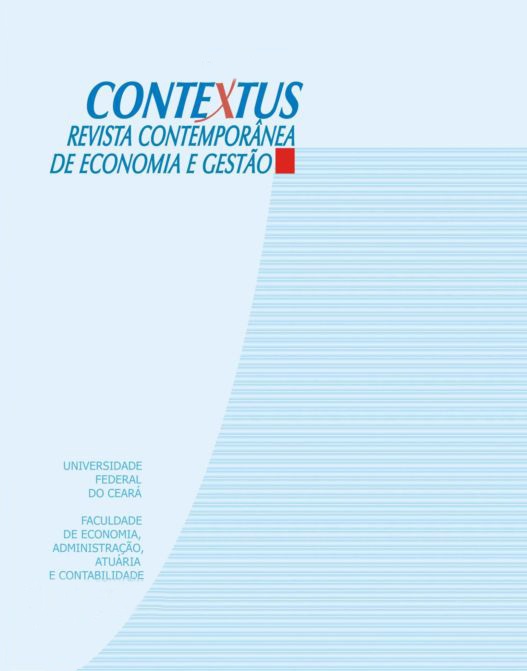ESTRUCTURA DEL PLAN DE REMUNERACIÓN DE EJECUTIVOS DE COMPAÑÍAS ABIERTAS DE BRASIL
DOI:
https://doi.org/10.19094/contextus.v14i1.795Palabras clave:
Plan de compensación. Hipótesis incentivo. Agencia teoría. Agencia de conflicto de intereses de alineación.Resumen
Este estudio tiene como objetivo mostrar la estructura del plan de compensación de las empresas brasileñas, identificar si los incentivos que se ofrecen a los administradores ayudan a minimizar el conflicto de agencia entre las partes. Un plan de compensación bien estructurada ayuda a la alineación de intereses entre principal y agente. El estudio secaracteriza por ser descriptiva, documental y cualitativa. Se analizaron las formas de referencia de 291 empresas que cotizan en bolsa que proporcionaron información sobre la compensación ejecutiva en los años 2011 y 2013. Más de la mitad de las empresas adoptar pague a corto plazo y pocas empresas indemnice post-empleo a sus ejecutivos. Estos factores contribuyen a los ejecutivos para maximizar sus propios intereses, dañando los intereses del principal en el largo plazo. Llegamos a la conclusión de que los planes de remuneración de las empresas públicas en Brasil facilitan la manipulación de la información, teniendo en cuenta que muchos de remuneración a corto plazo y la remuneración basada en las cifras contables.
Descargas
Citas
BEBCHUK, Lucian Arye; FRIED, Jesse M. Executive Compensation as an Agency Problem. Journal of Economic Perspectives, Pittsburgh, v. 17, n. 3, p.71-92, 2003.
BEBCHUK, Lucian A.; SPAMANN, Holger. REGULATING BANKERS’PAY. Georgetown Law Journal, New Jersey, v. 98, n. 1, p.247-287, 2010.
BEUREN, Ilse Maria; MAZZIONI, Sady; SILVA, Marcia Zanievicz da. Remuneração dos Executivos Versus Desempenho das Empresas. Revista Adm. Faces Journal, Belo Horizonte, v. 13, n. 2, p.8-25, 2014.
BRASIL. Instrução Normativa nº 480, de 07 de janeiro de 2009. Comissão de Valores Mobiliários (CVM). Disponível em: <http://www.cvm.gov.br/>. Acesso em: 22 fev. 2015
COUGHLAN, Anne T.; SCHMIDT, Ronald M.. EXECUTIVE COMPENSATION, MANAGEMENT TURNOVER, AND FIRM PERFORMANCE: An Empirical Investigation. Journal of Accounting And Economics, North-holland, v. 1, n. 7, p.43-66, 1985.
FARRELL, Anne M.; KADOUS, Kathryn; TOWRY, Kristy L.. Contracting on Contemporaneous versus Forward-Looking Measures: An Experimental Investigation. Contemporary Accounting Research, Toronto, v. 25, n. 3, p.773-802, 2008.
FERNANDES, Francisco Carlos; SILVA, Júlio César da. Remuneração dos Executivos: Análise dos Quatro Maiores Bancos Estatais e dos Quatro Maiores Bancos Privados Listados na Bm&Fbovespa;. In: Encontro da ANPAD, 37, 2013, Rio de Janeiro. Anais... Rio de Janeiro: 2013.
GONZAGA, Rosimeire Pimentel; YOSHINAGA, Claudia Emiko; EID JUNIOR, William. Relação Entre os Sistemas de Incentivos Oferecidos aos Gestores e Desempenho das Empresas Brasileiras. Revista Contabilidade Vista & Revista, Belo Horizonte, v. 24, n. 3, p.103-118, 2013.
JENSEN, Michael C.; MECKLING, Willian. H. Theory of the Firm: Managerial Behavior, Agency Costs and Ownership Structure. Journal of Financial Economics, v. 3, n. 4, p.305-360, 1976.
JENSEN, Michael C.; MURPHY, Kevin J.; WRUCK, Eric G.. Remuneration: Where we’ve been, how we got to here, what are the problems, and how to fix them. Harvard NOM Working Paper, Boston, v. 28, n. 4, p.1-105, 2004. Disponível em: http://ssrn.com/abstract=561305>. Acesso em: 20 abr. 2015.
KRAUTER, Elizabeth. Remuneração de Executivos e Desempenho Financeiro: um Estudo com Empresas Brasileiras. Revista de Educação e Pesquisa em Contabilidade, Brasília, v. 7, n. 3, p.259-273, 2013.
MACHADO, Débora Gomes; BEUREN, Ilse Maria. Política de Remuneração de Executivos: Um Estudo em Empresas Industriais Brasileiras, Estadunidenses e Inglesas, Bento Gonçalves, p.1-16, 2013.
NARAYANAN, M. P.. Managerial Incentives for Short-term Results. The Journal of Finance, San Francisco, v. 40, n. 5, p.1469-1484, 1985.
SOUZA, Paulo Vitor Souza de; FARIAS, Kelly Teixeira Rodrigues. Remuneração dos Executivos e Desempenho Financeiro das Companhias Abertas Brasileiras. In: CONGRESSO USP DE INICIAÇÃO CIENTÍFICA EM CONTABILIDADE, 12., 2015, São Paulo. Anais... São Paulo: -, 2015. p. 1 - 16.
WATTS, Ross L.; ZIMMERMAN, Jerold L.. Towards a Positive Theory of the Determination of Accounting Standards. The Accounting Review, Sarasota, v. 3, n. 1, p.112-134, 1978.
WATTS, Ross L.; ZIMMERMAN, Jerold L.. The Demand for and Supply of Accounting Theories: The Market for Excuses. The Accounting Review, Sarasota, v. 4, n. 2, p.273-305, 1979.
WATTS, Ross L.; ZIMMERMAN, Jerold L.. Positive Accounting Theory: A Ten Year Perspective. The Accounting Review, Sarasota, v. 65, n. 1, p.131-156, 1990.
Descargas
Publicado
Cómo citar
Número
Sección
Licencia
The authors, while doing the submission, accept the notice below:
We authors hold the copyright related to our paper and transfer Contextus journal the right for the first publication with a Creative Commons’ international license of the modality Attribution – Non-commercial 4.0, which in turn allows the paper to be shared providing that both the authorship and the journal’s right for initial release are acknowledged.
Furthermore, we are aware of our permission to take part in additional contracts independently for non-exclusive distribution of the version of our work published in this journal (e.g. publishing it in an institutional repository or as a book chapter), while acknowledging both the authorship and the journal’s initial publication.
We also certify that the paper is original and up to this date has not been released in any other journal, Brazilian or of another nationality, either in Portuguese or another language, as well as it has not been sent for simultaneous publication in other journals.
Last, we not only know that plagiarism is not tolerated by Contextus but also certify the paper presents the sources of passages from cited works, including those authored by ourselves.


